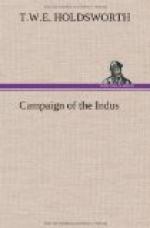25th; we had only four miles to the Pass, and the
Pass was five more, when we reached our new ground,
so it was not more than nine miles altogether, yet
it was 10 o’clock at night before the rear-guard,
bringing up the fag end of the baggage, came in.
For nearly the whole of this day I was exposed to an
infernally hot sun, and the stench arising from the
dead cattle was really frightful. I was also
literally twenty-six hours without getting a morsel
to eat or a drop to drink, and but the day before
on the sick-list. No wonder I was laid up!
This Ghwozhe Pass was a great deal worse than any part
of the Bolan. It was nothing but a succession
of the most difficult ascents and precipitous descents;
the most trying kind of ground for the poor camels,
who fell down in great numbers, and in some parts the
path lay between two high rocks, and was only four
feet wide; how the artillery got over it I cannot
imagine. A handful of determined men could, I
should think, defend it against an army. We were
on the qui vive the whole time, expecting an
attack on the baggage, but we only lost a few camels.
Here we caught up the 17th and artillery, which left
Dadur before us. If our toils had been great,
those of the 17th and artillery were twice as much,
as it took them two days and two nights to get the
guns through, and they were obliged to bivouack in
the Pass, and were attacked once or twice by the Ghiljees;
whom, however, one section or so easily drove off.
I must now tell you that on leaving the Bolan Pass
the Kaukers &c. made their bows to us, but handed
us at the same time over to the care of their intimate
friends the Ghiljees. These are a kind of half-civilized
robbers, a large clan, and abound throughout the whole
of Afghanistan. Their chief is a friend of Dost
Mahomed. They gave us a little annoyance on the
road, but whenever they did so they managed to get
the worst of it. They murdered a few poor camp
followers. At one place they fired on some grass-cutters
belonging to the 4th Light Dragoons, after coming
among them and talking with them in a friendly manner,
as is their usual custom, in order to ascertain what
might be the chance of an attack. A troop of
that corps was immediately sent out, with nearly all
the officers. Some villagers who had been bringing
things to our camp joined the robbers, but the 4th
played the d—l with them, killing or wounding
about forty, and only one horse belonging to the 4th
was wounded. Major Daly, who commands the corps,
killed four men himself with a simple bamboo hunting
spear, used for killing boars. Sir J. Keane had
fourteen of them shot that had been caught stealing
camels at Quittah, one march from Siriab, where we
left our sick: a brigade of the Bengal army is
quartered there.




